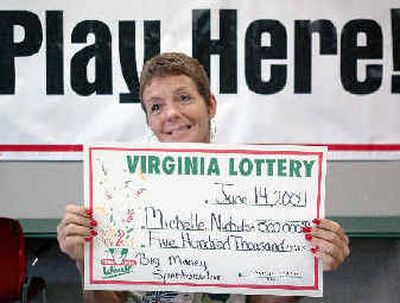Anonymous kidney donor wins $500,000 in lottery

HAMPTON, Va. – A woman who forever changed the fortunes of a man she didn’t know by anonymously donating a kidney has come into a small fortune of her own, winning $500,000 in the Virginia Lottery.
“I think if you do good things for people, good things will happen to you,” Mitzi Nichols of Virginia Beach said during a news conference Tuesday at the lottery’s regional office.
Nichols, a 44-year-old cashier in the gift shop on the Chesapeake Bay Bridge-Tunnel, bought her winning scratch-off ticket Monday.
She plans to keep her job and use her winnings – $355,000 after taxes – to buy her first house, a truck for her husband in the Navy and a car for herself, and to help her daughter return to college.
She’s also going to pay to fix the broken-down car of the man who no longer needs to be hooked up to a dialysis machine because of her organ donation.
Calvin Saunders of Portsmouth said in a telephone interview that he was overwhelmed by Nichols’ continuing generosity.
“I told her, ‘You’ve given me enough by giving me a kidney,’ ” said Saunders, 54, a medical transport driver who had suffered from kidney failure.
Nichols said she was working as a dialysis technician at a hospital in the 1980s when, seeing how kidney patients suffered, she decided she would someday help a kidney patient. In 2001, she anonymously donated a kidney – without specifying a recipient because she didn’t know anyone who needed one.
While organs are transplanted from people who died and from living donors, such as spouses, parents and siblings, stranger-to-stranger donations from living donors are rare.
Since 1999, more than 30,000 kidneys have been transplanted from living donors, according to The Organ Procurement and Transplantation Network, the nation’s transplant system. Of those, only 214 were from anonymous donors.
Following transplant protocol, Saunders and Nichols didn’t get to meet until a year after he received her kidney.
The two keep in frequent touch, and Saunders calls Nichols on Mother’s Day, her birthday, Thanksgiving and Christmas.
“She’s part of me, and I’m a part of her now,” Saunders said.